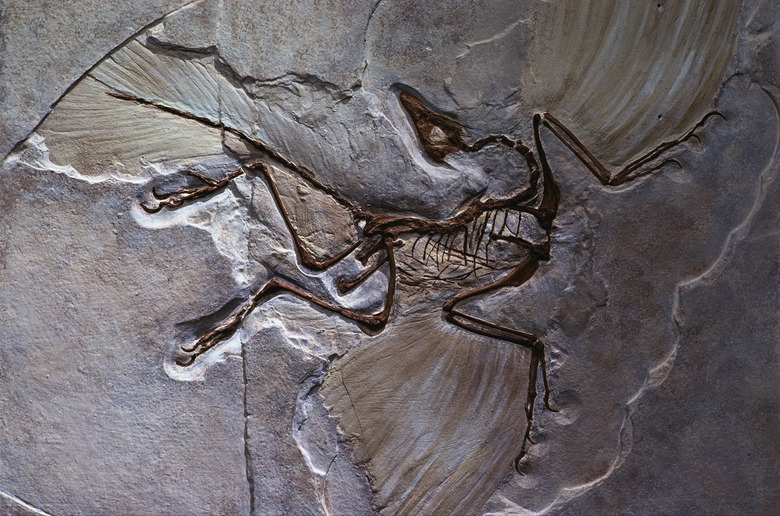Kinds Of Fossil Rocks
Fossils are prehistoric hard rock remains or traces of plants or animals preserved in sedimentary rocks. Some of the plants or animals existed millions of years ago. Usually fossils are preserved by being buried underneath multiple layers of sand of mud. The sand and mud turn into sedimentary rock when under tremendous pressure. Minerals replace the organic matter, producing a stone replica of the prehistoric matter. Although fossils are found throughout the world, they're not commonly found in all types of rocks, but generally only in sedimentary rocks such as sandstone, limestone or shale.
Mold Fossils
Mold Fossils
A mold fossil forms when an organism dies and then layers of sediment cover it. The organism slowly decomposes, leaving a negative imprint of its body in the sediment. While some mold fossils have been able to preserve an organism's entire image, others only show a portion of it. A shell imprint in the sand is an example: After the sand hardens, the shell may dissolve, which leaves a space with the shape of the shell in the rock. This space is called a mold fossil.
Cast Fossils
Cast Fossils
Cast fossils are fossils formed when sediments fill up a mold, creating a solid mass that resembles a rock. This usually happens when water seepage deposits minerals in the mold. As the mold is filled, the deposited materials harden, which produces a copy of the original fossil. The cast shows the outward appearance of how a creature once looked.
Although mold fossils and cast fossils seem the same, they're different. While the mold forms the outside of an object, the cast is formed from within the mold. A good way to understand the difference is to compare ice to the tray holding the ice. In other words, the tray is the mold and the ice is the cast.
True Form Fossils
True Form Fossils
True form fossils are the fossilized remains of real animal or plant parts or the entire organism. These fossils can be from animals or plants trapped in ice, tar or amber. An organism can be fossilized because of a method known as unaltered preservation. For example, an insect could be trapped in tree sap, turning the organism into a true form fossil.
Body Fossils
Body Fossils
Most body fossils are those found on the hard portions of an organism's body, such as bones, claws, teeth, outer skin or scales and other parts. However, sometimes fossils have been uncovered of softer body tissues from muscles, tendons and organs. Bone fossils are the basic source of learning about dinosaurs. Fossilized bones for numerous dinosaurs have been discovered since the first dinosaur bone was found and classified in the first quarter of the 19th century.
Trace Fossils
Trace Fossils
Trace fossils, also called ichnofossils, are fossils that record behaviors patterns and movements of prehistoric organisms such as dinosaurs. Examples of trace fossils include matter such as nests, burrows, footprints and gastroliths (small stones swallowed by birds).
While mold and cast fossils are replicas of body impressions or skeletal remains, trace fossils show sedimentological upheaval from animal activities such as feeding, resting or moving. Ichnofossils can also be marks, imprints, nests, eggs, manures or burrows. An example of an ichnofossil is a dinosaur track preserved in fine sand or mud.
Misconceptions About Fossils
Misconceptions About Fossils
Occasionally minerals can grow within rocks into shapes resembling fossils, but they aren't fossils. An example is dendrite crystals, which are often mistaken for fernlike fossils. Concentrations of minerals in sediments are sometimes mistaken for eggs that have been fossilized. Also, modern plants and animals can be mummified by coats of calcium carbonate salts (travertine) from spring water. Although they're not true fossils, these remains may eventually harden and turn into fossils over time.
Cite This Article
MLA
Kichura, Venice. "Kinds Of Fossil Rocks" sciencing.com, https://www.sciencing.com/kinds-fossil-rocks-5460894/. 30 September 2021.
APA
Kichura, Venice. (2021, September 30). Kinds Of Fossil Rocks. sciencing.com. Retrieved from https://www.sciencing.com/kinds-fossil-rocks-5460894/
Chicago
Kichura, Venice. Kinds Of Fossil Rocks last modified August 30, 2022. https://www.sciencing.com/kinds-fossil-rocks-5460894/
